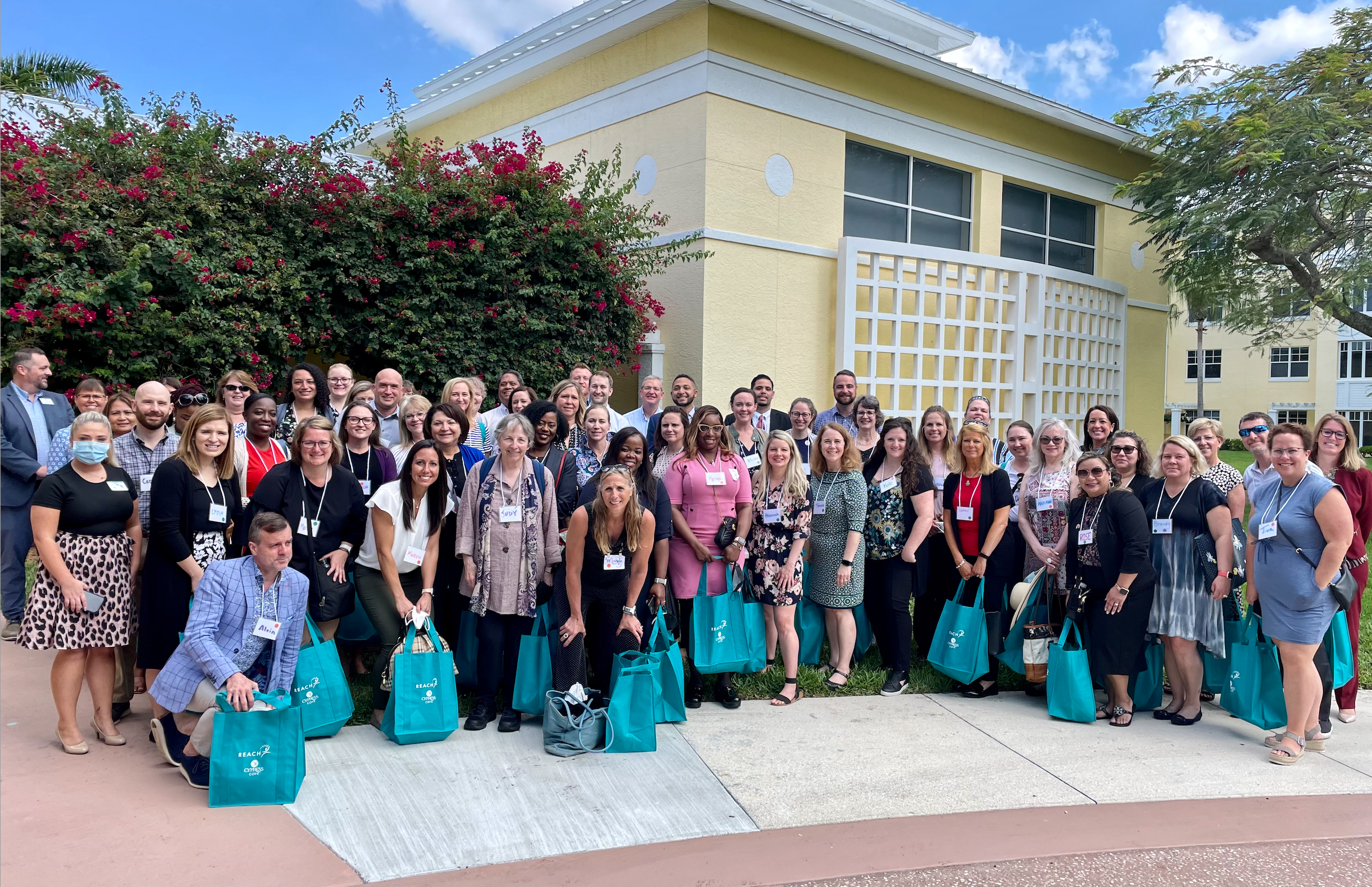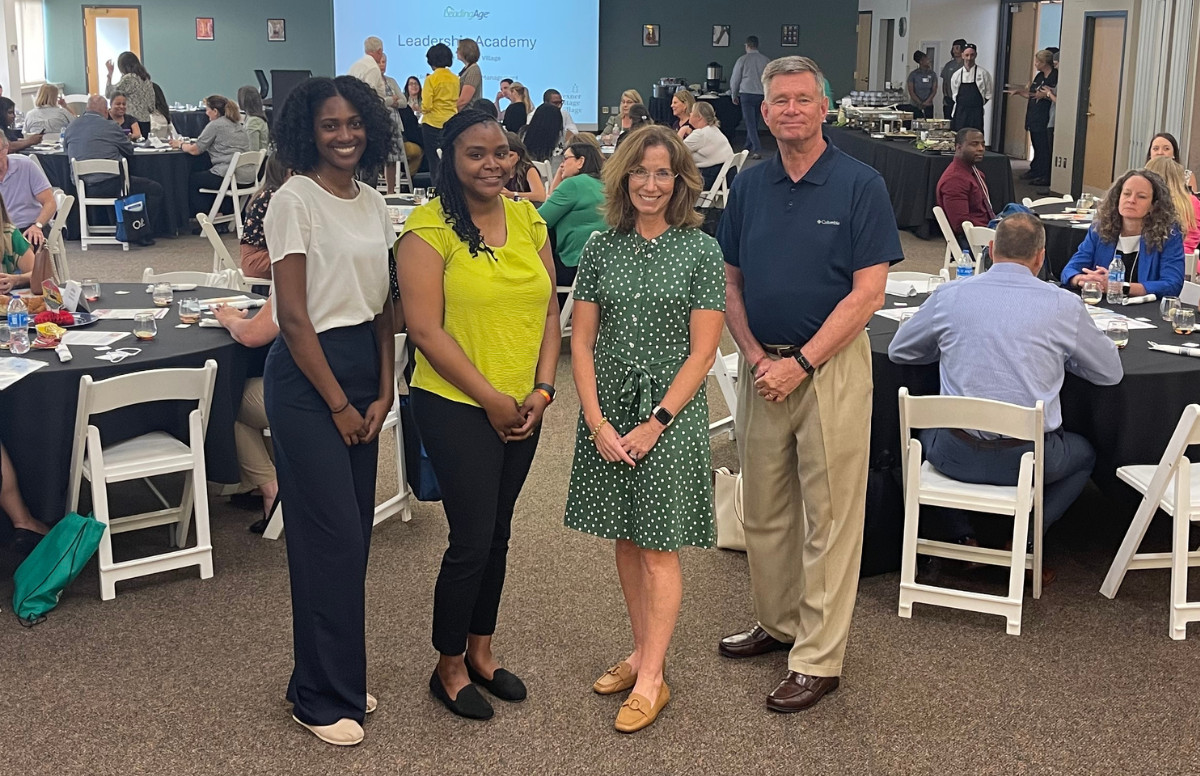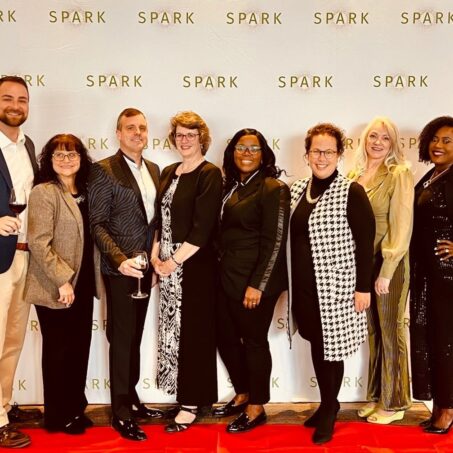Past Fellows of the Larry Minnix Leadership Academy have become all of those things and more. Since the Leadership Academy’s first class in 2007, current and future leaders have struggled, reflected, talked, laughed, cried, and learned important lessons about themselves. The one-year Academy experience has helped to improve leadership skills, build strong professional connections, and just as importantly, created lasting friendships. Best of all, Academy graduates inspire and mentor new generations of leaders.
Academy Fellows have formed a thriving alumni network that is one of the most active networking groups in the LeadingAge family.
An integral part of the Academy experience for every Fellow is the Action Learning Project (ALP), which is designed to help participants turn an innovative idea into reality—and throughout that process, learn about themselves and their ability to navigate change while experimenting with Academy concepts. Developing their ALPs, Fellows focus their thinking on dreams and ideas for the field—ideas that in some cases, they’ve considered for years—to turn loosely organized concepts into crystalized concepts, practical blueprints, defined steps, and measurable outcomes. While ALPs begin in the Academy, they almost never end there; many ALPs have turned into long-term, continually evolving programs, processes, and even businesses.
With the application open for the 2025 Academy program, we talked with a few past Fellows who have turned their ALPs into notable achievements. Here are their stories.
Adaptive Programming for Children and Young Adults With Complex Medical Needs
Alvin Moyer, M.D. (2022 Academy Fellow), chief medical officer at Elizabeth Seton Children’s Center in Yonkers, NY, chose an Action Learning Project that would build on his work serving children with complex medical conditions. Both he and a Seton colleague, Director of Quality Christopher Moore, R.N. (2019 Academy Fellow), were interested in going beyond the medical needs of the children and young adults they treat.
“What really got me thinking was the hope that we could help our residents do well not only because of the medical care we provide, but also because of the love, attention, and activities we provide,” Moyer says. “And as corny as that sounds, it really does help because it helps prevent complications of their illnesses, which could shorten their lives.”
Elizabeth Seton is preparing for the 2025 opening of a new 96-resident young adult center to offer highly specialized skilled nursing, respiratory, medical, and rehabilitative care, along with a wide range of social and spiritual programming. The Center, says Moyer, “will be the first of its kind—specifically designed for survivors of childhood diseases who age out of pediatric services.”
With Moore, Moyer created a cross-disciplinary committee focusing on the expansion of young adult programming services. The committee meets monthly and has begun to implement new ideas, including:
- Expanding community partnerships, such as joining a local Miracle League baseball organization to benefit residents.
- Hiring several new recreation therapists to work with the young adults, and who will move to the new Center when it’s completed. Moyer says by hiring them now, the therapists can get to know the young adults and test out new programming ideas.
- Using grant funding to hire an adaptive gaming technologist, whose job is to make gaming and technology services more accessible to people with mobility and cognitive challenges.
“We really wanted to look at programming—extra things we can do here for children that recognizes the unique needs of our kids,” Moyer says. “Some of our kids have pretty significant sensory integration problems, or limited levels of consciousness, or limited motor abilities. Many are ventilator-dependent. Part of my Action Learning Project was finding community partners to collaborate with. We’re looking into schools that might help with volunteers, such as teenagers in the community. We’d love our young adults to have more normative experiences with people their own age.”
Moyer credits the Leadership Academy experience for teaching him new ways to think: “The first thing the Academy [taught me] was not to focus. In other words, to start from ground zero and think outside the box. In my training as a physician, it’s really about following a prescriptive course of treatment—this is what you do, and this is how you treat that. But it doesn’t approach creativity, like recognizing that play can be a form of therapy that can achieve some therapeutic goals.”
He also credits the Academy for encouraging Fellows to recognize the strengths of the people they work with. “You don’t have to be the author of everything, you don’t have to be in control of everything,” he says. “This young adult programming committee is inviting people from every care discipline to participate, and giving everybody an equal voice in how we move forward.”
A Collaborative, Cross-Disciplinary Forum for Improved Quality
Camille Burke was chief operating officer of Christian Living Communities (CLC), Engelwood, CO, in 2010 during her year as a Leadership Academy Fellow. Concern about new payment models, driven by the passage of the Affordable Care Act, was widespread in every sector of health care. For hospitals as well as long-term care providers like CLC, transitions of care—and the need to reduce hospital readmissions—was the focus of much effort.
Burke’s Action Learning Project was a vision that later became the South Denver Care Continuum (SDCC), a collaborative group of nursing homes, home and community-based services providers, hospitals, and ambulance companies. SDCC is a forum that allows different providers to talk and work out better ways of working—a group that collectively found ways to improve transitions of care throughout the continuum, reduce hospital readmission rates (which Burke says dropped from 17% to less than 5% in the area), and improve quality of care as older adults moved through the continuum.
“I was very clear, this [was not to be] a marketing discussion,” says Burke. “It’s about how do we provide better services to older adults we’re serving? How do we get them through the continuum of care and how do we prevent them from going to the hospital?”
Burke says her Leadership Academy experience made SDCC possible: “If it had not been for the Academy, I would not have given thought to the care continuum, and the future payment model. Quite frankly, I would also not have developed the friendships that I have to this day. I believe that this project has impacted the [field], and I think those friendships and this project are both equally impactful.”
Burke later became interim CEO at CLC. When she left at the end of 2020, the work of SDCC continued and remained true to that vision; she has since been invited back to speak to members and to speak on SDCC’s behalf at conferences. Today, she is chief growth and strategy officer for GSI, the management and development arm of Bellevue, WA-based Transforming Age.
Making Home Care a Reality for Aging Services Providers
Mark Goetz says he owes his business to the Leadership Academy. HomeCare Advocacy Network, a franchising company he co-founded with his wife Sierra in 2020, was created to help both entrepreneurs and aging services organizations launch home care services.
Goetz has long experience in the in-home care franchise business, having worked 13 years for Home Instead Senior Care. He also spent several years in nonprofit aging services with LeadingAge member Asbury Senior Living in Frederick, MD. It was his experience running the Asbury Home Services division, in a field he says he knew little about before coming to Asbury, that led to HomeCare’s emphasis on helping not just entrepreneurs, but also senior living organizations, make their mark in home care services.
His experience in the Academy (2019 Academy Fellow) was crucial to his idea becoming reality. He recalls sitting with other aging services executives in the Academy, discussing the prospects of adding home care services, realizing from his previous experience that he could bring that model to aging services providers.
“The [Academy] gave me exactly what I needed professionally to blend dream discussions with the best senior living professionals in the business,” Goetz says. “It gave me confidence; I got to really work through our potential value proposition. We had to raise serious capital for our company and without the Action Learning Project, my idea would have been half-baked.”
A Holistic Wellness Program
Aline Russotto, executive director of Orchard Cove, part of Boston-based Hebrew SeniorLife, says her Leadership Academy experience (2010 Academy Fellow) is what enabled her to lead the creation of a holistic wellness program now serving all Hebrew SeniorLife communities and other provider organizations nationwide. Vitalize 360 is designed to help residents achieve a greater quality of life by focusing on all its aspects: health, nutrition, physical and mental fitness, community participation, learning, and spirituality. It was launched jointly a decade ago with Kendal Corporation, and was inspired by an earlier joint program called Collage, built on a coaching and assessment model.
“I think I dared to be bolder because I was in the Academy,” says Russotto. “It gave me the focus and the space to work on advancing something that probably would not have gotten my attention if I were not in the Academy. I was able to apply the leadership skills that were uncovered, and the leadership lessons, and apply them to this project.”
The Academy connection persists to this day. Rebecca Donato, Russotto’s 2010 Leadership Academy classmate, now works for Hebrew SeniorLife as executive director for Vitalize 360. Russotto cites Donato’s valuable role in developing the concept during their year in the Academy.
“The program has entirely transformed the way we deliver care and services to the residents who live at Orchard Cove,” says Russotto. “We [can] ensure that all of our programs and services are aligned with what residents tell us is important to them. In turn, it allows residents to have a better quality of life and better health outcomes.”
The partnership with Kendal has ended, and Hebrew SeniorLife is planning the next evolution of Vitalize 360, possibly combining it with another program, Right Care, Right Place, Right Time, that integrates wellness teams into affordable housing communities.
The LeadingAge Larry Minnix Leadership Academy and the Action Learning Projects that grow out of it have made a tremendous impact on the careers of these Fellows, the organizations they represent, and the field of aging as a whole. Applications for the 2025 Larry Minnix Leadership Academy are now being accepted; the deadline is July 15, 2024.
Visit the main Leadership Academy page to learn more. For a better understanding of the Academy experience, read 10 Surprises About the Leadership Academy Experience.

 Shutdown Week Three: Impact of Ongoing Closure on Affordable Housing
Shutdown Week Three: Impact of Ongoing Closure on Affordable Housing





